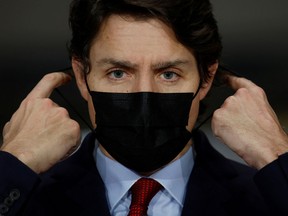Article content
By Christine Van Geyn, Sujit Choudhry and Janani Shanmuganathan
The declaration of a public order emergency will be seen as a grave mistake that should never be repeated

By Christine Van Geyn, Sujit Choudhry and Janani Shanmuganathan
On Feb. 23, the Canadian Constitution Foundation filed an urgent application for judicial review of the government’s decision to invoke this extraordinary piece of legislation. This application will still proceed because it is imperative this legislation receive scrutiny the first time it is used, especially when the circumstances of its use are so questionable.
The Emergencies Act gives the federal cabinet the exceptional powers to unilaterally proclaim a public order emergency. After the federal cabinet proclaims a public order emergency, vast legislative authority is delegated to the cabinet. This authority encompasses the power to create new criminal offences and police powers, without recourse to Parliament, advance notice or public debate.
The prime minister will still need to answer in court
In this case, the government enacted measures to limit assembly, direct people to assist the RCMP with towing vehicles, and require banks to disclose otherwise private banking information to the police. The measures captured a broad range of conduct that carried with it the threat of fine or imprisonment. In his announcement ending the public order emergency, the prime minister made it clear that any enforcement measures from when the act was invoked will continue. These are extraordinary powers, and when the Emergencies Act was enacted in 1988, it was designed to ensure that the abuses under its predecessor, the War Measures Act, never happened again. The War Measures Act was used during the Second World War to intern Japanese Canadians and Italian Canadians, and was abused during the FLQ crisis in Quebec in 1970. This is a dark and troubled history we need to remember when considering the context in which the Emergencies Act was drafted and the conditions under which it can be invoked.
Every provision of the Emergencies Act is designed with the intent of limiting the federal cabinet’s power to declare an emergency to only those situations where it is absolutely necessary, to grant to the cabinet only the powers it needs to deal with that particular emergency, and for the powers to exist only as long as the emergency exists.
The federal cabinet did not have reasonable grounds for concluding there was a public order emergency that justified invoking the Emergencies Act, no matter how challenging and difficult it perceived the ongoing protests to be. Invoking the Emergencies Act was not absolutely necessary, as the law requires. Federal, provincial and municipal law enforcement already had all of the legal tools and authorities they needed to respond to the protests, and their perceived failure to effectively respond does not mean that the government was authorized to invoke the Emergencies Act. These are the tools that the prime minister has said are now capable of addressing any ongoing or re-emerging issues. The stringent conditions set by the Emergencies Act for declaring a public order emergency were clearly not met.
Protests aren’t emergencies, even if the protests are disruptive and even if the protests have illegal elements. Politicians and police must handle civil disobedience using the laws they have available to them rather than invoking emergency legislation whose criteria they do not meet and which has a dark history of abuse.
Additionally, the government will need to defend that the emergency measures they enacted were compliant with the Charter. There has been much punditry about the fact that the Emergencies Act is subject to the Charter. Which is, of course, true. All statutes, orders and regulations are subject to Canada’s Constitution. However, this does not mean that the government always acts in a way that is compliant with the Charter. In this case, the emergency measures violated the right to free assembly, the right to be free from unreasonable search, and the right to liberty. These violations are not minimally impairing and are not justified infringements, especially given that they have are continued even after the protests have cleared.
The interpretation of the Emergencies Act by the courts will be historic, and the declaration of a public order emergency will be seen as a grave mistake that should never be repeated again.
Special to National Post
Christine Van Geyn is the Litigation Director for the Canadian Constitution Foundation (CCF), one of the organizations challenging Prime Minister Trudeau’s invocation of the Emergencies Act. Sujit Choudhry is a constitutional lawyer and scholar, and Janani Shanmuganathan is a criminal defence lawyer, and they are representing the CCF in this case.